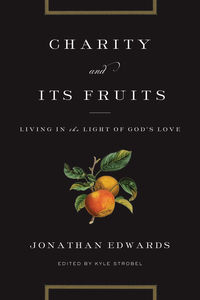As you may know from Kent’s interview posted here, my new book Charity and Its Fruits: Living in the Light of God’s Love (Crossway, 2012) has now been released. Charity and Its Fruits was a sermon series through 1 Cor 13, and is, therefore, a theological exposition on love. So, why does it matter? First, I think it is important to see Edwards put his incredible mind to work on 1 Cor 13. As much as this passage is thrown about at weddings, few have really sat with how difficult a passage it is. Therefore, secondly, let me explain why I think it matters through two key theological moves Edwards makes. 
The first key theological move Edwards makes is his exposition of the “nature” of God. God’s nature, as we know from 2 Pet 1:4, is communicable, and therefore God’s nature is not the same thing as God’s essence. Furthermore, God is love, therefore love, in some way, is God’s nature. Edwards runs this through his trinitarian theology to grasp the reality that God’s own life is a life of loving consent and union. It is God knowing himself and loving himself fully as perfect beauty and holiness. Therefore, God becomes the archetype by which our own journey of love is etched.
The second key move is to pick up on Paul’s comment that whereas faith and hope fade away, love never will. Love is eternal. Love is the only currency in heaven, as it were. The vision of God known in heaven, therefore, serves to orient our lives now. Just as the vision of God will create a perfect loving society, so should the sight of faith create a society of love here. These two lines come together since God is the God of love and the telos of our histories. As we journey towards heaven we journey towards God. Love, therefore, is proleptically provided to us from heaven. It is not of this world. Love, therefore, actually is the Holy Spirit given in regeneration. It is only as we know God that we can love him and love our neighbors as ourselves.
These two main moves do a lot of work for Edwards in Charity and Its Fruits. His fascinating depiction of spiritual gifts, for instance, hinges on the first distinction. Love is the “better way” because it is who God is and what the heavenly country is about, therefore gifts of power (healing, tongues, etc.) are not necessarily gifts only given to Christians but can be given to unbelievers as well. “Power”, as it were, is not a part of God’s nature, even though it is true of him. God doesn’t have to give himself to someone to give them power, but he does give himself to someone to give them love.
What you find in Charity and Its Fruits is a mini theology of love. For those who critique the Reformed tradition for failing to focus on the Christian life as a life of love, then this is your book. Allow Edwards to put Reformed theology to work for you.

Congrats, Kyle on the publishing of your edited book! I look forward to reading it.
Bobby, I see the cover of your book with Hybets advertised although I don’t see it on Amazon yet. When it comes out, send me a copy at Huntington so I can review it here!
Cheers.
Thanks Bobby! You as well, I can’t wait to read it.
Thanks Kyle. Hope you guys are settling in to the Phoenix, AZ lifestyle well (great time of the year to move there ;-). I lived there for awhile, my brother and wife live there currently; maybe we could hook up some time when we’re down there to visit my brother. Anyway, congrats again on the book!
Tnanks man! Yeah, let me know if you come out!
Hi Kent,
Will do, and thank you!
It is available cuurently through the publisher, Wipf and Stock; and will be available through amazon in a few weeks. I will be in touch with W&S to see if we can’t get you a review copy. Appreciate the offer Kent! Blessings.